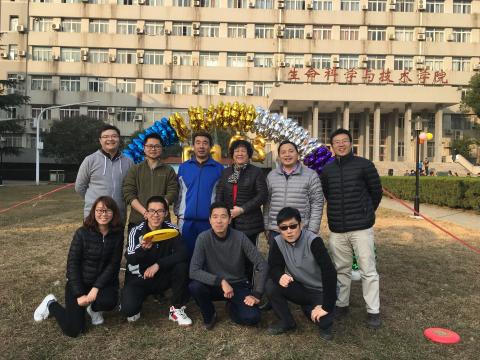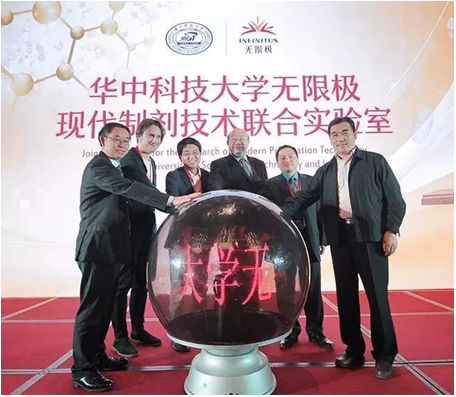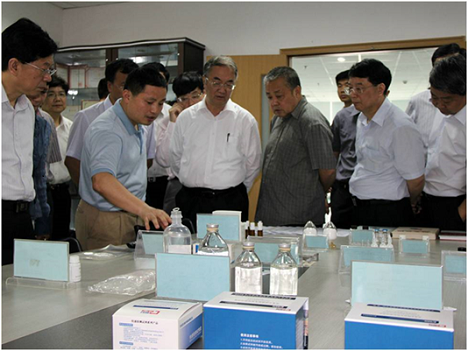About us
Based on the Institute of Materia Medica, College of Life Science and Technology, division of nanomedicine and biopharmaceuticals was established in 2012. It is now as a branch within the College of Life Science and Technology at Huazhong University of Science and Technology (HUST). The division has undergone substantial transformation over the years. Its predecessor was founded as early as 2003 with the approval of Science and Technology Department of Hubei Province. In 2009, the Ministry of Science and Technology of P. R. C. approved the establishment of the National Research Centre for Nanomedicine. In 2010, with the approval of Ministry of Education, P. R. C.,our undergraduate program was founded as the first batch of the undergraduate major among universities.
Now the division stands as one of the national engineering institutions of nanomedicine. We have 17 faculty members currently, more than 150 undergraduates and over 80 graduate students. Among our faculties, we have 1 “973 Program” chief scientist, 2 “The Thousands Youth Talents”, 1 “Cross-Century Talent of Ministry of Education”, 1 “Chutian Scholar of Hubei Province” and 1 “Huazhong Scholar”.
The division carries out inter-disciplinary research in key research areas, such as: nanomedicine, pharmaceuticals, biomaterials, diagnosis and detection. In recent 5 years, we have obtained many competitive research grants from the government of China, including 2 National Basic Research Programs of China (973 Programs) (one as the chief scientist, the other one as member), 1 National High-Tech R&D Program (863 program), 1 National “Major New Drug Development” scientific program, more than 10 grants from basic research programs from the Natural Science Foundation of China (NSFC), 3 provisional funds, and more than 20 funds from corporations.

Education
We aim to empower tomorrow’s leading scientists and technological talents. Relying on the National Research Centre for Nanomedicine and Wuhan National Bioindustry Base, our teaching and training provide in-depth study and independent research with good infrastructure, state-of-the-art facilities and interactive training. Our curriculum integrates basic science and the latest technological skills set much needed by the industry. The undergraduate major of nanomedicine and biopharmaceuticals gained accreditation of the Ministry of Education, P. R. C., in 2015, and was approved as the pilot major in the "undergraduate major comprehensive reform" of Hubei Province, in the same year.
We offer a wide range of undergraduate and graduate curriculum, including 18 undergraduate theoretical courses, 5 undergraduate experimental courses, 4 practical teaching courses and 7 graduate theoretical courses, to enrich and support the over-all development of students. Students can benefit from a broad-based education in multiple disciplines taught by top-notch academics. Due to our dedication in teaching, we were awarded many prominent teaching prizes from HUST, such as 2nd prize in Teacher's Teaching Competition of HUST, 2nd prize in teaching quality among HUST, and “Sanyu ren” prize of HUST, etc. Professor Yang Xiangliang gave speech for a whole cohort of teachers in the university to share his experience in education. Apart from our emphasize on research for all our faculty members, we encourage our undergraduate students to participate in research programs. They have won awards in BIOMOD and iGEM in consecutive years and manage to publish articles in the international peer-reviewed journals.
Research Focus
Apart from nurturing students with a passion for study and research, we provide a vibrant and nurturing environment for faculties and students to carry out inter-disciplinary research in key areas such as:
1. Nanomedicine
The key of nanomedicine research is the design of novel nanodrug delivery systems (NDDs). By integrating new nanoscale phenomena and synthesis methodology in design and preparation of NDDs to attain unmatched enhancement in properties, they exhibit interesting characteristics, such as favorable biodistribution, targeting, controlled release, high bioaffinity etc, compared to the traditional NDDs. They have been the recent research focus and hotspot.
2. Biomaterials
Biomaterials, comprising of polymer, metal, HAP, nanohybrid materials, provide unique mechanical properties, good biocompatibility and biodegradability. They have wide application in tissue engineering, TACE, etc.
3. Diagnostic and detection
Nanomaterials, such as contrast agents of magnetic resonance imaging and ultrasound, provide merits of high sensitivity, ultraspecificity, ease of hand-on, and simultaneous multicomponent detection. They have wide applications in the early detection of cancers, infectious diseases, hereditary diseases etc.
Awards and Achievements
1. Hydroxyethyl starch, as a substitute of plasma, has realized industrialization. It was awarded 2 new drug certificates, and won the 1st prize in scientific and technological progress of Hubei Province in 2009
2. Professor Yang Xiangliang has been elected as one of TOP 10 highly-cited scholars in the area of pharmacology, toxicology and pharmacy by “Elsevier”, a world-renowned publisher, in 2014 and 2015.
3. More than 60 granted patents and more than 10 new drugs certificates. Most of them has realized industrialization and gained remarkable social and economic benefits.
4. 3 Published books: Nanomedicine, Nanotoxicity, the Safety of Nanomedicine.
5. A new strategy based on thermosensitive nanogel is developed to solve a long-standing problem in clinic between the mobility of embolic materials and embolism. The nanogel, as TYPE III medical device, has finished the pre-clinical studies in the treatment of hepatocarcinoma. Now it has found more applications in self-imaging embolic nanomaterials and comprehensive therapies.
6. A in vitro diagnostic kit is developed for critical diseases diagnosis and gaine successful application in the area of diagnosis. An automatic magnetic separation food safety detection instrument is invented for the food safety testing. It has wide prospect in the food safety detection.
All in all, we provide an integrated science-driven and application-oriented education in advanced nanomedicine technologies. We believe that your journey in our division will be fulfilling and enriching!


